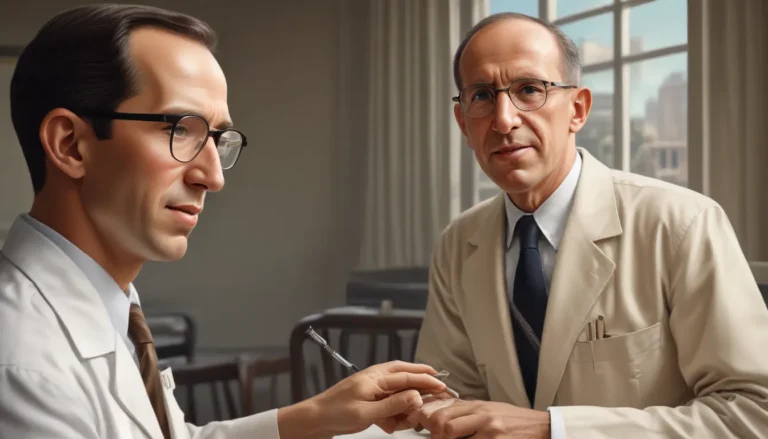The images in our articles may not match the content exactly. They are used to grab your attention, not to show the exact details in the text. The images complement the text but do not replace it.
Michael Faraday, born in 1791 in Newington Butts, England, is celebrated as one of the greatest scientists in history. His groundbreaking contributions to the fields of physics and chemistry have had a lasting impact on the world we live in today. Join us on a journey as we explore eight astounding facts about Michael Faraday and his remarkable achievements that continue to shape modern technology and chemistry.
Unraveling the Life of Michael Faraday
Michael Faraday, a self-taught scientist, defied the odds by rising from humble beginnings to become one of the most influential figures in scientific history. Despite limited formal education, his insatiable curiosity and dedication to learning propelled him to greatness.
The Breakthroughs of Electromagnetism
Faraday’s research on electromagnetism stands as a testament to his genius. Through experiments with magnets and electric currents, he uncovered the laws of electromagnetic induction and electrochemistry, revolutionizing the field and paving the way for modern technology.
The Invention that Transformed Technology
One of Faraday’s most significant contributions was the invention of the electric motor. This revolutionary device, powered by electromagnetism, laid the foundation for countless technological advancements that continue to shape our world today.
Discoveries in Organic Chemistry
In his exploration of organic compounds, Faraday stumbled upon the discovery of benzene, a critical building block in modern chemistry. His work in this area not only expanded our understanding of organic compounds but also opened doors to further scientific exploration.
The Enduring Legacy of Faraday’s Law
Faraday’s law of electrolysis, formulated in the 1830s, remains a fundamental principle in chemistry. This law describes the relationship between the amount of substance produced or consumed in an electrolytic reaction and the electric current passed through the electrolyte, laying the groundwork for electrochemistry.
A Humble Leader in Science
Despite his monumental achievements, Faraday remained humble and rejected a knighthood offered to him by the British government. His steadfast belief that honors should not overshadow the pursuit of scientific truth exemplifies his unwavering dedication to his craft.
The Gift of Communication
Faraday’s exceptional ability to communicate complex scientific concepts in a clear and engaging manner made him a revered lecturer. His popular lectures at the Royal Institution in London not only attracted large audiences but also inspired countless aspiring scientists to follow in his footsteps.
Pioneering Modern Technologies
Faraday’s groundbreaking work continues to influence modern technologies, including electric power generation, electrical transformers, and various electrochemical processes. His legacy lives on in the devices and processes that have become integral parts of our daily lives.
Michael Faraday: An Enduring Inspiration
Faraday’s legacy as a brilliant scientist and a dedicated pursuer of knowledge continues to inspire scientists and individuals alike. His revolutionary work in understanding light’s interaction with magnetic fields, as showcased in the Faraday effect, and his laws of electromagnetic induction and electrolysis, form the bedrock of modern physics and chemistry.
FAQs
Q: What were some of Michael Faraday’s major contributions?
A: Michael Faraday made several major contributions, including the invention of the electric motor, the discovery of electromagnetic induction, and the concept of electrolysis. These groundbreaking discoveries laid the foundation for the development of modern electrical technology.
Q: How did Michael Faraday influence the field of physics?
A: Faraday’s work had a profound impact on physics, leading to the development of Maxwell’s equations and the understanding of electromagnetic waves, which ultimately paved the way for the development of radio technology.
Q: Was Michael Faraday a self-taught scientist?
A: Despite his lack of formal education, Michael Faraday was largely self-taught, demonstrating that dedication and curiosity can lead to significant contributions in the scientific community.
Q: Why is Michael Faraday considered an inspiration?
A: Faraday’s humble origins, relentless pursuit of knowledge, and unwavering passion make him an enduring inspiration. His story serves as a reminder that anyone can make a significant impact through hard work and determination.
Embark on a journey of discovery and exploration as you learn more about the remarkable life and legacy of Michael Faraday, a true pioneer in the world of science and technology. Dive into the rich history of his groundbreaking discoveries and be inspired by his unwavering dedication to the pursuit of knowledge. Join us in celebrating the achievements of this extraordinary scientist whose work continues to shape our understanding of the natural world.






